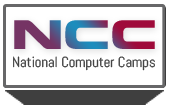Cool at Computer Camp
By Richard Weizel, Globe Correspondent
FAIRFIELD, Conn. – When Chris Lillios joined two dozen other curious-but-skeptical youngsters at the first summer National Computer Camp 25 years ago he recalls wondering ”whether it was cool or I was just some 13-year-old nerd.”
Today, Lillios is an independent computer software consultant in Palo Alto, Calif., who credits his three summers at National Computer Camp with helping him find his niche in life. ”My father thought computers were just a phase that would pass, but we had a feeling we might be part of something pretty unique,” said Lillios, 38.
This past week marked the end of another summer session of National Computer Camp, launched in a small junior high classroom by Fairfield University professor Michael Zabinski, who made what sounded like a bold prediction in a 1978 newspaper article about his camp: ”Eventually, it will become part of our daily routine to become involved with computers,” he said. That was three years before the first personal computer was made widely available to consumers, Zabinski said.
These days the program involves 1,100 campers at four sites, including Sacred Heart University in Fairfield, and remains one of about a dozen summer computer camps in New England. It’s among fewer than 100 across the country solely devoted to computers, according to the American Camping Association of New England, in Natick, which accredits summer camps and educates camp professionals.
”I wouldn’t call myself a prophet or anything like that, but I did always believe computers would become a major part of our daily existence, and that it was a natural around which to design a summer camp for youngsters,” said Zabinski, a professor of physics and engineering.
In the early days, students worked on computers that didn’t have hard drives, and were forced to save their programs on cassettes that often lost material.
Lillios, who has an undergraduate degree from Princeton in electrical engineering and computer science, and a master’s in electrical engineering from Stanford University, remembers attending the first summer session in 1978 and ”being completely astonished when we were able to design a simple video-type game at the computer camp. I can just imagine what they’re doing now.”
Campers now work on state-of-the art personal computers or their own laptops to learn college-level computer programming and design their own Web sites and computer games.
”Our goal has always been to stimulate or foster campers’ interest and talents in computers, but today we can obviously provide a much more sophisticated environment that more closely equates to a university or college course,” Zabinski said. ”The kinds of things our campers are now doing are mind-boggling compared to what they were able to do in the beginning.”
Last summer, Daniel Perelman, 13, designed a checkers game. This year, he tried a tougher one based on the movie ”Tron.”
”I’ve been using computers since I was 2 or 3 years old, and it’s my favorite thing to do. I couldn’t imagine doing anything else over the summer,” said Perelman, of Woodbridge, Conn.
Daniel’s mother, Mary Lee Barker, has sent Daniel and his older brother Nathan to National Computer Camp the past few years. ”They aren’t interested in the outdoor sports, but they have always loved computers,” she said.
Bette Bussel, executive director of the American Camping Association of New England, said that although general-interest camps that offer a range of indoor and outdoor activities remain the most popular, camps such as the National Computer Camp provide an alternative for youngsters with more specialized interests. ”To have lasted 25 years and still be thriving proves the camp is still meeting the needs of their campers and providing them with the kinds of programs that are rare to find,” Bussel said.
Zabinksi got the idea for a computer camp after the National Science Foundation gave him a grant in 1977 to teach computer training to secondary-school teachers. ”I felt it would be nice to reach young people directly,” said Zabinski, who estimates that more than 25,000 campers have attended the computer camp summer sessions. In addition to the one in Fairfield, there are camps in Atlanta, Cleveland, and Pittsburgh.
Zabinski promotes his camp as the first of its kind. ”Back then we were the only ones doing it in a summer camp setting and nobody had ever done it before, so we were in uncharted territory,” he said. ”But over the years with the incredible advances in computer technology, such as the Internet, our campers are designing far more sophisticated programs.”
The daily camp curriculum includes at least five hours devoted to computers, though campers spend up to 12 hours on their computers. But they also play tennis and kickball or read and watch movies in the afternoon. The typical camper stays for weekly or two-week sessions, which cost $740 per week, rooming in college dorms. The camper-counselor ratio is about 6-1, Zabinski said.
On a recent morning more than 50 campers were busy clicking away on screens and jumping up excitedly whenever they successfully navigated a new computer program and designed a game or Web site that worked.
David Still, a 15-year-old from Larchmont, N.Y., said he will have ”a big headstart on the Java programming I am planning to take in school” when he starts a private high school in the fall. ”This camp was exactly what I was looking for,” said Still, who wants to be a computer programmer. ”And it was great being around other kids who were as excited to be around computers as I am.”
This story ran on page B9 of the Boston Globe on 8/4/2002.
© Copyright 2002 Globe Newspaper Company.
